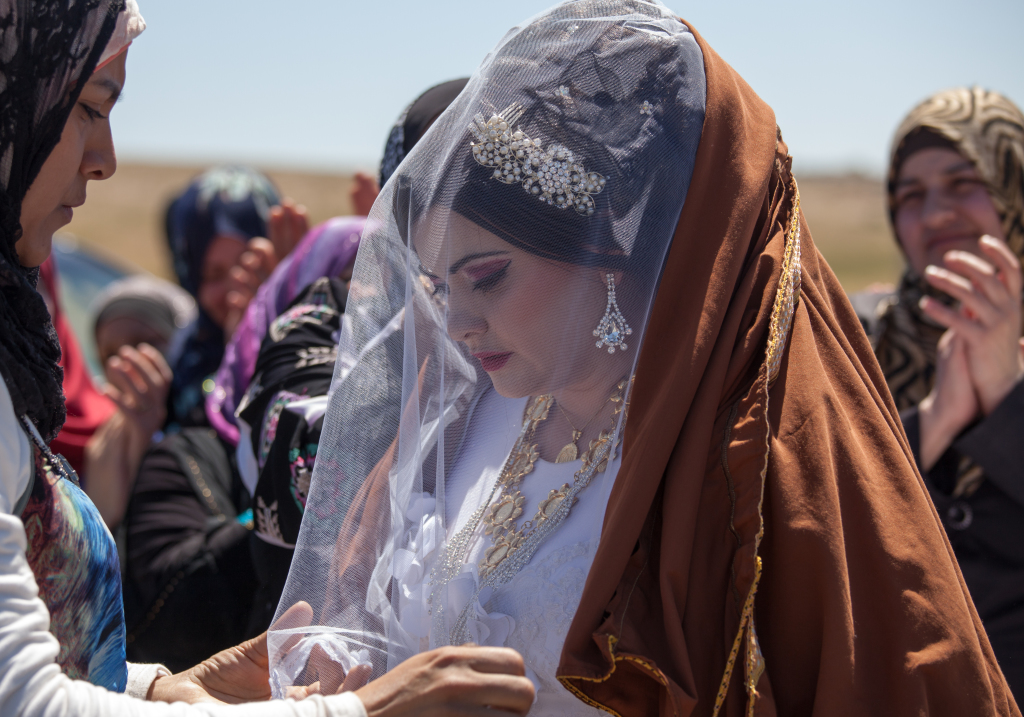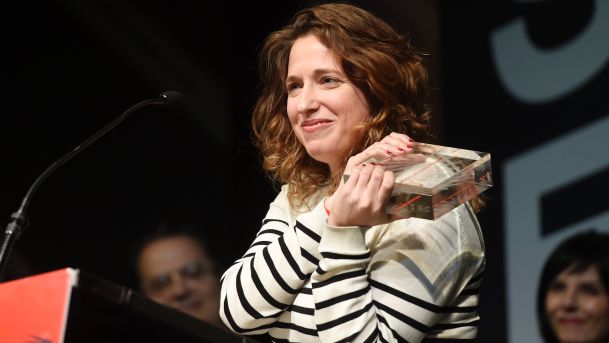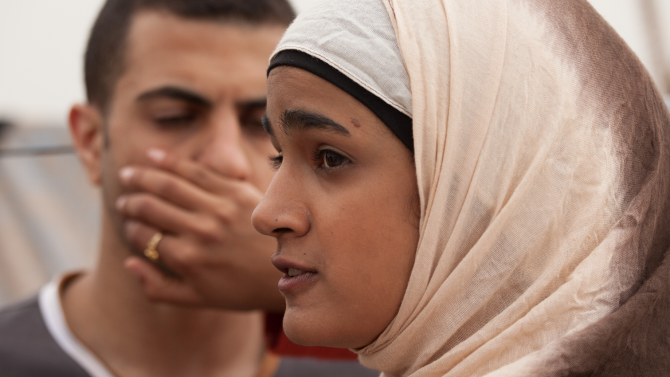
Jose here. Elite Zexer’s Sand Storm takes place in a Bedouin village where men have all the power, even if it’s evident it’s women who should be running things. Within this community we meet the young Layla (Lamis Ammar), a free spirited young woman who is secretly dating a local boy, aware that her parents might want to marry her to someone else. Even though the premise might seem familiar, what’s remarkable is how Zexer crafts a study about the structure of this village, making the film feel more like an anthropological study than a traditional drama. After successful showings at Sundance and Toronto, the film went on to win the top Ophir Award making it Israel’s official submission for the Oscars. I spoke to Zexer about the origins of the story, her curious background, and whether she thinks her film is a political work.
Read the interview after the jump.
JOSE: The film is based on an experience you had visiting a Bedouin community, do you remember what about it made you think this was a story that needed to be told?
ELITE ZEXER: My mom does a lot of things, but one of them is shooting still photography, she began shooting Bedouin communities 10 years ago, she connected with many of them and would visit them often. It got to the point where if we wanted to see our mom we had to go to the Bedouin communities, so she dragged her whole family with her! It was me, my sister, my dad, my mom and we started going there on holidays, they would also visit us. A lot of the girls realized my mom was a great photographer so the girls asked her to take pictures of their weddings, so she did up to four weddings a week in different communities, we went with her to one of the weddings and there was an episode similar to what happens in my film. It was very emotional for me, it woke up something in me that made me want to make this movie. It took me another four years of research to decide I could write a script. I knew that I wanted to make this film 10 years ago, but I kept meeting more girls so I waited until I was ready to make the film.
JOSE: Some of these weddings were probably arranged and/or loveless, did you find an element of sadness in the photographs?
ELITE ZEXER: There was an element of sadness, these weddings are divided into women and men. My mom took pictures of the girls’ side, so it would be them with their families, and friends. The pictures were just for the brides, they weren’t to be shared, they were just to make the girls happy. The girls spend a lot of time at home, they’re very close to their family and leaving their home is very emotional. Usually there were lots of tears, people are sad because she will leave her home, but not every girl is sad about getting married, some of them have been waiting for it, and are looking forward to it.
JOSE: Marriage is also a way of survival for these women.
ELITE ZEXER: This society is defined by family, and girls need to get married to be part of the society. I actually can’t point out single women that I know there, they’re married, divorced or widows.
Your mother is a photographer, you’re a filmmaker. Would you say that was a natural choice, or did you ever consider a different career path?
Actually I studied science, my diploma is in chemistry and computers, I thought I was going to be a scientist, but after my first semester in university I decided I didn’t want to spend my life in a lab. I remember growing up I was very artistic, but I never thought of it as something I’d want to do. I left university and came to Los Angeles, began interning for different jobs and I fell in love with the profession. I moved back to Israel, got a degree in Film Studies and it was obvious to me this is what I wanted to do.
Your scientist side comes out in how objective the film is, since it never shows heroes or villains. Was this challenging to achieve in the screenplay?
The film is a big combination of everything I am, I wanted my filmmaking to be about the characters, directing the actors was all I cared about, if the acting was working I was good. I chose the shots based on the realism of the emotions. At the same time I felt my script was almost mathematical, it had a formula, everything had to come together in a way that was almost like math. When I edited it I didn’t have to move or change anything, it’s edited exactly as I wrote it, that’s the math side of my brain. I don’t believe in villains, so that’s why there aren’t any in my films, I believe we’re all living in a reality and we need to be the best people we can within this reality.
The father in the film isn’t precisely absent, but he’s also not a very influential character in terms of his moral contributions, and yet he has more power than the mothers. In the film we see him fearful and self-conscious at times, as if he’s aware of the crumbling structure he’s trying to maintain.
He’s one of my favorite characters, because he goes through so much in trying to be the best person he can be within this society. At the beginning of the film he believes he is a good family man, even though he makes choices that seem to say otherwise.

The film ends with an image that’s both a condemnation and an invitation to make change. What do you want people to take from it?
I don’t know what the future holds, I don’t know if society will change, so I didn’t want to end the film telling you what the future holds because I don’t know. But there is another generation, and I want them to wonder what will happen next, but not tell them exactly where it’s going to go. If you’re asking if my film is a call for political action I don’t know the answer to that question (laughs) it was really important for me to make this film because there are things happening that people need to be aware of. Not just the world, even Israel, the Bedouin villages are so close but Israeli people don’t know what’s going on. There is a road you see in the film many times, but in reality people never stop by these villages, it’s like they’re living in different universes. I made this film because this world needs to be connected.
Sand Storm is in theaters today.


Other Foreign Film Oscar Interviews
Singapore - Boo Junfeng on the prison drama The Apprentice
Colombia - Jose Luis Rugules on Alias Maria
Italy - Gianfranco Rosi on the prize-winning Fire at Sea
Brazil - Daniel Burman on how Little Secret became Brazil's submission
Foreign Film Contender Reviews
Death in Sarajevo - Bosnia & Herzegovina | Neruda - Chile | Mother - Estonia | Elle - France | Toni Erdmann - Germany | The Salesman - Iran | Chevalier - Greece | Sand Storm - Israel | Fire at Sea - Italy | Desierto - Mexico | A Flickering Truth - New Zealand | Apprentice - Singapore | Age of Shadows - South Korea | Julieta - Spain | My Life as a Courgette - Switzerland | Under the Shadow - UK | From Afar - Venezuela